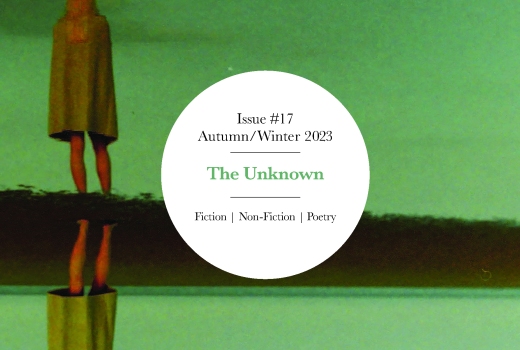After an early dinner on their last night in Provincetown, Rob and his daughter Mandy walked to the beach. Light reflected off the water, dappling the waves, and glimmered past a slow-moving boat, also lit up. There were mingled smells: grilled food, the sea, Mandy’s perfume.
The flash of Mandy’s phone reflected off her windbreaker. She’d barely spoken to Rob since he’d told her to stop taking empty water bottles out of the wastebasket. She would line them up on the dresser in their room, as if this was going to magically recycle them.
Besides her added height, she’d gotten moodier in the six months since he’d seen her last. She could switch on the sulk, a steady drip-drench. He didn’t need to share a wet blanket threaded through with I-Don’t-Want-To-Be-Here.
“If you’ve got something else you want to do, go ahead,” he said.
A staircase led from the beach to the parking lot behind the inn where they were staying, next to the sushi place where he’d watched her pick at her food. She could go join the kids from the night before, or maybe meet a new group on Commercial Street.
After she started to jog away, Rob called, “Not too late!”
She kept running on long bare legs, dark shorts, darker jacket, into the twilight. Fourteen was young, although sometimes not so. Forty-four was too, though also not really.
The first time Mandy said she wanted to go explore on her own, he’d come out to this same spot, watched white sailboats anchored in the bottle-clear shallows. Then he’d walked along the water, the bay ruffling blue eastward. Ahead of him, a large dock, part of a complex of multiple buildings, stretched over the sand. It was a well-known cruising spot. The night before, after Mandy had fallen asleep, he’d considered it. Instead, he just remembered what it had been like under there.
There was no reason to go there during the day unless you were a seagull or something looking for scraps. He’d taken out his phone and called his office to check on their progress with the new patient-focused software.
When she was eight, Mandy told Rob she liked that he was a dentist, because “people are scared of you.” At twelve, as Rob and Mandy’s mother Andi were splitting up, Mandy said that she’d read how a lot of dentists committed suicide, and she made him promise he wouldn’t do that after he moved out. Rob gave her some additional facts: her grandfather and great-grandfather, also dentists, had not done so. She said okay, maybe Grandpa, but since she’d never met her great-grandfather, how did she know he wasn’t lying? Like you lied to my mother, Rob thought she would say next.
Rob started walking the way his daughter had gone. He kept letting her go off on her own. They were supposed to be spending time together.
When he came to the top of the staircase and into the parking lot, he was surprised to see her there. They met at the trunk of his car, as if they’d planned it.
“What happened?”
Mandy shrugged. She didn’t seem upset, just bored, or distracted.
They went back to their room. Mandy had the bed and Rob the fold-out couch. He wasn’t being cheap, getting one room; he thought it would give them more time together. Luckily, there was a communal bathroom on their floor that was vacant most of the time while she was installed in their private one.
“Dad, did Mom tell you?”
“What?”
“Remember when you said I’d learn about life and death when I had a pet?”
He’d told her a lot of things. How could he not be a good parent? His patients were all kids. He asked them what flavor polish they wanted, bubble gum or mint? He played Santa with his gift bags of toothbrush, mini-toothpaste, and floss.
“Did you know Lila… We went to the vet and they put her to sleep?”
Andi had told him Mandy preferred to be called Amanda now, but whenever he forgot, she didn’t react. He hadn’t heard about the dog.
“I think she got sad when you left.”
That was two years ago, he almost said.
“Dad, is there something you want to tell me?” she asked after ten minutes passed, after he’d picked up his book.
“About what?”
“Why did we come here?”
“To spend time togeth—”
“Is there something you want to show me?”
“Besides that I love you very much?”
One reason that people came to Provincetown was surf-casting on Race Point. Rob thought it might be interesting to watch, if not actually to fish. But the weather had been cold for early October, and then it had rained. Mandy didn’t like that they would have to drive on the beach to get there. Cars and trucks on the sand were damaging to the environment. You might not encounter the dolphins your plastic bottles were endangering but you would hear the sand crabs cracking under the all-wheel-drive.
Rob turned on the TV. The screen showed the guide for all stations, and he scrolled through it.
“Mom said you and your friend Ben met here, and maybe you wanted to show me the places you went.”
Andi would probably never forgive him. But would she ever stop trying to define for their daughter who he was?
“Ben’s gone,” Rob said.
“Does that mean you’re coming home?”
Speaking of suicide, he almost said.
He flicked through channels. Mandy went back to her phone. Outside, the tide was easing in. By dawn, the water would have risen under the large dock down the beach. Then, as the tugging of the new day drew it back, birds would hop along the wet-packed sand, beaks busy at the bubbles of buried things.
*
Jon Fain is a writer and editor living in Massachusetts. Some of his recent publications include short stories in A Thin Slice of Anxiety and The Argyle Literary Magazine, flash fictions in The Broadkill Review and Midsummer Dream House, micro fictions in Blink-Ink and ScribesMICRO, and a chapbook of flash fiction, Pass the Panpharmacon!, from Greying Ghost Press. Twitter/X: @jonsfain










